Jun 2020 1st Edition
Jun 2020 1st Edition Estelle Greeff
Translations
Abuse victims need help to heal
Abuse victims need help to heal Estelle GreeffPhysical scars left by violence and abuse may heal over time, but the emotional scars may never heal if not treated.
 The Department of Social Development says victims of violence and abuse who seek professional help benefit greatly from these supportive external interventions, which help them heal and become empowered.
The Department of Social Development says victims of violence and abuse who seek professional help benefit greatly from these supportive external interventions, which help them heal and become empowered.
According to the department’s spokesperson, Lumka Oliphant, there has been an increase in the number of gender-based violence (GBV) cases during the coronavirus disease (COVID-19) lockdown. Now, more than ever, the services of the department’s Victim Empowerment Programme (VEP) are crucial to helping abuse victims emerge stronger and more resilient.
In response to the increased levels of GBV, government has developed an emergency pathway for survivors to get the help they need. One of the interventions is to ensure lockdown regulations are structured in such a manner that a woman can leave her home to report abuse without the fear of a fine, intimidation or further violence.
Oliphant stresses that in order stop their abuse and begin healing, victims must speak out and seek help.
Violence and abuse can be described as sources of trauma on an individual adult or child; whereas a victim is a person who has suffered harm – including physical, emotional or mental injury – economic loss or substantial impairment of their rights.
“If violence and abuse, especially against children, are not addressed, they have the potential to turn a child into an abuser or a victim for life. The emotional effects, which are invisible, will be felt on the structure and functioning of the brain, which will change for the worst and impact the behaviour of the person,” says Oliphant.
“Counselling, psychotherapy and psycho-social support will be the most effective interventions to transform a victim into a survivor,” she adds.
Psycho-social support is an ongoing process of meeting the physical, emotional, social, mental and spiritual needs of individuals.
Oliphant says the support of the person’s family and significant others are also important because they will reassure the individual that there is nothing wrong with them and that their rights were violated.
This support is also important to strengthen the intervention of professionals and alleviate the anxiety, stress and other negative behavioural effects, such as low self-esteem.
“Untreated violence contributes to post traumatic stress disorder, which changes one’s functioning completely. Victims can also live in fear and that has the potential to drive them into depression and isolation,” she says.
“The empowerment of victims in a holistic manner reduces secondary victimisation, encourages their co-operation with the criminal justice process, reinforces socially desired behaviour and acts as a deterrent to offenders or potential offenders,” Oliphant says.
Oliphant adds that some of the support systems that the Department of Social Development has in place include;
- Crisis intervention and overnight accommodation for victims
- Referral to VEP shelters within 24 hours
- Linkage with local police stations and health services.
For more information on how abused victims can get help contact the Gender-Based Violence Command Centre on 0800 428 428. Send an SMS with the words ‘Help’ to 31531 or a Call Me Back with the USSD code: *120*7867#.
The centre caters for people with speech and hearing impairments through Skype. To use this function, one must add ‘HelpMe GBV’ on their Skype account. The GBVCC website address is: www.gbv.org.za
Artists make a song and dance of hygiene
Artists make a song and dance of hygiene Estelle GreeffThe Future Stars Theatre Project in Emalahleni, Mpumalanga, has collaborated with a Pretoria-based music recording company to produce a dance that teaches the youth about the importance of hygiene during the coronavirus (COVID-19).
Future Stars’ Roger Ntuli (38) says the choreography brings to life a song about the virus that was recorded by Chaithoo Studio artists Ria, Diya, Dinesh ‘Mr D’ Chaithoo and Prince ‘Shembry’ Sithole.
Ntuli says the nine- to 14-year-old dancers came up with the choreography and the dance is being shared virally.
“The production ideas came from the dancers. It was easier for them to create something relevant to their peers. We want to make sure that the message reaches young people and that they understand the coronavirus does not only affect the elderly.”
In the popular video, the dancers are seen wearing masks and gloves and carrying placards that call on their peers to stay safe. They demonstrate the elbow greeting, sanitising their hands and social distancing.
“When we did the video, we used information from the Department of Health as a guiding tool. We made sure that the message we were conveying was accurate and in line with what government is advising people to do,” Ntuli says.
The dance video by Future Stars Theatre Project won a lockdown challenge hosted by Chaithoo Studios, in which people were invited to record and submit a dance done to the studio’s COVID-19 song.
The song is a combination of electronic dance music, gqom, hip-hop and Indian fusion and contains the lyrics “Wash your hands every day. Sanitise every hour of the day… Sanitise, sanitise, don’t delay. Use your soap every day. Use your soap, don’t delay… Corona I am not your friend. Go away. Go away.”
Become a virtual tourist from your armchair
Become a virtual tourist from your armchair vuyelwanFinding innovative ways of doing things will help tourism enterprises survive the coronavirus lockdown.
Tour guides in the Western Cape, such as Jeremy Howard, are being given a chance to continue earning a living, by becoming virtual guides who lead people on digital tours of the province’s attractions.
Through the One Day campaign, developed by provincial government’s tourism and trade agency Wesgro, local tour guides will make use of streaming services to conduct virtual tours, which are shown on YouTube. Currently, 12 local tour guides have been identified to lead the tours, which cover attractions on the Cape West Coast, the Garden Route, the Karoo, the Overberg, Cape Town, the Cape Winelands and the Cederberg. 
The tours are made possible by various technologies, such as photography, video and Google Street View. The local tour guides then take visitors through the videos, sharing their knowledge of the various attractions. At the end of the tour, viewers can pay the guides through digital channels.
Howard (54) is a tour guide who works for Energy Tours. He is part of the One Day campaign and became the first guide to conduct a virtual tour – covering the Cape West Coast. He says that he is excited that tour guides are able to use technology to continue with their work.
“This is such an amazing campaign. The opportunity to be seen as an innovative guide leading the way in technology is enormous.”
Howard first got into tour guiding when South Africa won the bid to host the 2010 FIFA World Cup. He says that tourism offers an amazing chance to meet new people and show them the beauty of South Africa.
He says that people in the tourism industry should not despair during these difficult times. “Personally, I hope to be seen as an innovative guide and also an indication that one does not have to sit and wallow in self-pity, but rather get up and do the hard yards.”
* National government is supporting the tourism industry through the R200 million COVID-19 Tourism Relief Fund, the Unemployment Insurance Fund and other initiatives. For more information, contact the Department of Tourism on 0860 868 747.
COVID-19
COVID-19 vuyelwanHelp prevent the spread of respiratory disease like COVID-19
Wash your hands often with soap and water for at least 20 seconds.
Covid – 19 Hotline:0800 029 999
Childline gives children a lifeline
Childline gives children a lifeline vuyelwanThe lockdown caused by the coronavirus (COVID-19) has not stopped non-profit organisation Childline South Africa and its 86 counsellors from assisting children and families calling in to seek help.
Childline provides a 24-hour, toll-free telephone counselling service in all nine provinces. Since the start of lockdown, the organisation has received an increased number of calls.
It has assisted with providing information about COVID-19 and responding to cases of abuse and neglect. Other issues have included children being separated from their parents, parents drinking and not obeying lockdown regulations, and many more.
Nokulunga Mnisi is a Childline crisis counsellor from Mpumalanga who has been taking calls from children, young people, families and community members.
She says children and young people may be experiencing increased levels of emotional and mental stress during this time.
Mnisi often deals with cases of child neglect and gives advice to children reporting cases of abusive parents.
“Talking is part of breaking the chain of child abuse. Once you talk out, change will start to happen, no matter how long it takes.”
During her work, Mnisi has also seen how the community has pulled together to help each other.
“Neighbours are looking out for each other and some have called in about suspected abuse cases. As ever, grandparents are playing an important role by stepping in when children’s parents are not available or are unable to cope.”
United Nations International Children’s Emergency Fund (UNICEF) South Africa is one of Childline’s partners. Mayke Huijbregts, Chief of Social Policy and Child Protection for UNICEF South Africa, says that organisations such as Childline are crucial during this time.
“Children are much more anxious, fearful and emotionally vulnerable. They are not able to play with their friends or go to school. So Childline is filling a gap in their lives.”
*If you are a child, parent, relative or concerned citizen, you can call Childline toll-free on 08000 55 555 to report suspected abuse or neglect, or for any other information about safety and mental health during the pandemic
Cigarette ban will save lives
Cigarette ban will save lives JoySmokers who contract the coronavirus (COVID-19) are at risk of suffering more severe symptoms.
 COVID-19 is a respiratory virus. As such, smokers are twice as likely to suffer more serious symptoms than people who have never smoked, says Dr Catherine Egbe, a specialist scientist at the South African Medical Research Council’s Alcohol, Tobacco and Other Drug Research Unit.
COVID-19 is a respiratory virus. As such, smokers are twice as likely to suffer more serious symptoms than people who have never smoked, says Dr Catherine Egbe, a specialist scientist at the South African Medical Research Council’s Alcohol, Tobacco and Other Drug Research Unit.
Dr Egbe says that smoking is known to cause many of the underlying medical conditions that have been linked to severe symptoms of COVID-19.
These include:
- cancers
- heart disease and stroke
- asthma
- diabetes.
“Even if smoking does not directly cause a smoker to die from COVID-19, it could cause this indirectly because smokers are more likely to have the diseases that could make a person die of the virus,” she says.
In addition to this, cigarette smoking harms nearly every organ of the body and generally reduces the body’s ability to fight diseases.
Dr Egbe says that tobacco smoking produces more than 7 000 chemicals; 250 of these chemicals have been confirmed to be toxic to the human body. Out of these 250 chemicals, 69 are known to cause cancer. This reduces the health of smokers as well as those exposed to second-hand smoke, Dr Egbe explains.
She says that those who have TB and asthma are also high-risk patients where COVID-19 is concerned.
“So far, there is evidence to show that those who have asthma are at risk of having severe symptoms or even dying if they contract COVID-19. There is no study that has been published showing TB patients’ risk but the World Health Organisation has warned that it is not unlikely that persons with TB will have poor treatment outcomes if they contract COVID-19.”
She says the decision to ban the sale of cigarettes under the current lockdown level is in the interests of the people.
Sale of cigarette
President Cyril Ramaphosa had initially announced that under Level 4, cigarette sales would be allowed but government reversed the decision after the National Coronavirus Command Council consulted with medical experts and various role-players.
Dr Egbe says apart from the direct health implications of smoking, cigarettes are often shared among friends which can lead to faster community transmission of COVID-19.
“Remember, people are being asked to avoid touching their mouth, nose and eyes. When a person is smoking, he or she will not be able to keep to that hygiene practice,” says Dr Egbe.
In a country with a high prevalence of HIV/AIDS, TB, substance abuse and alcoholism, among others, Dr Egbe believes that government made the right call.
She says government is using the data at its disposal to take precautionary measures to continue to protect South Africa from experiencing the scenes witnessed in countries like Italy.
“It’s not a permanent ban; people must remember that,” she says.
Currently, South Africa has a limited number of ventilators and should the number of those needing ventilators spike during the pandemic, the country would find itself in a corner and not be able to help those who need aid.
“We have a little over
3 000 ventilators. Imagine if those above 65 years who are smokers, happen to need ventilators. We will need over 10 000 ventilators only for that group alone. That is one of the things that government is trying to avoid. We hope that people will see this as a good reason to quit smoking,” she says.
Did you know?
You can call The National Council Against Smoking at 011 720 3145 to assist you to quit smoking.
The Cancer Association of South Africa runs an online programme, which provides support and information for smokers who would like to stop smoking on http://www.ekickbutt.org.za.
City of Tshwane calls on residents to submit IDP comments online
City of Tshwane calls on residents to submit IDP comments online vuyelwanThe City of Tshwane is appealing to residents to digitally submit their comments on the drafting of the Integrated Development Plan (IDP).
This is due to lockdown restrictions that do not permit mass gatherings.
“The review of the IDP provides the platform for laying down strategic interventions for the next three years. This allows for a public participation process through which the communities are able to comment on the developments they require in their respective wards and on the proposed tariff increases, which come into effect on July 1 2020.
“This exercise is done through public meetings in various communities, however, due to the lockdown which prohibits mass gatherings, we are required to use other means, including media platforms, to solicit comments from our communities on matters that affect them daily,” the municipality says in a statement.
The Local Government Municipal System Act, 2000, states that each municipal council must, within a prescribed period after the start of its elected term, adopt a single, inclusive and strategic plan for the development of the municipality.
Details of the draft IDP are available on the City of Tshwane official website, www.tshwane.gov.za.
Comments and input can be submitted by email to the following address: IDPcomments@tshwane.gov.za by 15:00 on 19 June 2020 or hand-delivered to the IDP comments box, reception desk, Ground Floor, Tshwane House, 320 Madiba Street, Pretoria.
Companies urged to pay special UIF benefits to employees
Companies urged to pay special UIF benefits to employees JoyIt is cruel and insensitive for employers to not pay their employees after receiving funds from the Unemployment Insurance Fund (UIF) COVID-19 Temporary Employer/Employee Relief Scheme.
This practice has been condemned by the Minister of Employment and Labour Thulas Nxesi.
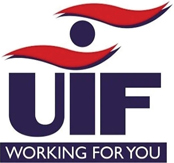 The minister described the practice as insensitive to the needs of workers, especially when many people are facing financial distress due to the coronavirus (COVID-19) pandemic lockdown.
The minister described the practice as insensitive to the needs of workers, especially when many people are facing financial distress due to the coronavirus (COVID-19) pandemic lockdown.
The UIF has been inundated with calls from workers complaining that employers have not paid them their benefits, despite having received funds from the UIF.
“I want to categorically state that this is inhumane and employers who are withholding funds meant for workers must immediately release payments. We are in the midst of a global pandemic that has brought the economies of countries to their –knees,” says the Minister.
How to check if your employer has funds
The UIF system has been upgraded to allow employees to check the status of claims submitted by their employers. Employees can access their employers’ records by entering their ID number. They will be able to see how much has been paid to the company and the specific amount paid to them as an employee.
“We have companies that are misrepresenting us by claiming they have not been paid when, in fact, they have,” the minister says.
He referred to a case in which Unibisco – a company in the Eastern Cape – accused the UIF of not having made a payment following its application.
“Our records indicate that this company was paid R539 595 on 24 April to pass on to their workers,” Minister Nxesi says.
How much has been paid to companies
The UIF says it has paid more than R11 billion in relief benefits to over 161 000 employers so that they can pay more than two million employees.
Other payments have been made through the bargaining councils for 56 641 employees, represented by 909 employers. They have been paid R155 481 810.86.
Commissioner of the UIF Teboho Maruping urges companies that have not provided the UIF with the details necessary to enable payments to be made to do so urgently, so that a further 503 629 workers can benefit from the over R2 billion that the department is ready to pay.
Just over R100 million has been held back, pending the provision of the correct details, which is putting these workers and their families in a desperate situation.
The full list of companies paid by the UIF is available on www.labour.govza. You can also reach the UIF at the toll-free number 0800 030 007.
Coronavirus survivor’s plea: Obey government regulations
Coronavirus survivor’s plea: Obey government regulations UrsulaA young South African woman who has recovered from the coronavirus (COVID-19) says citizens of all ages and races need to take the deadly disease seriously and obey the regulations set by government.
Ncebakazi Willie (27), from the rural village of Xhora in the Eastern Cape, got the virus when she was working on a cruise ship in March.
“The cruise ship had stopped in Italy, where the virus was starting to get very serious. There were a lot of people dying there.”
When Willie returned to South Africa, she decided that she should get tested at her local hospital.
“I knew that there was a risk that I might have contracted the virus but I could not self-isolate because I live with a family of 10 people. So I went to the hospital and had a test done.”
Her test was positive.
“I was shocked because I did not have a single symptom. I felt completely normal. This is what makes the virus dangerous, the fact that people can be spreading it without even knowing they have it.”
Willie says she hears a lot of South Africans saying that the virus will not affect them.
“This is not true. This virus can infect anyone, no matter if you are young or old, white or black. I urge everyone to take it seriously. It is selfish to think that you cannot get it. If you think like that and don’t take the necessary measures to protect yourself, then you will get the virus and spread it to other people.”
Willie says that in Italy, she saw first-hand how badly the virus can affect a country when people do not follow health guidelines.
“People in Italy did not take the lockdown seriously. Thousands of people have died and the healthcare system is struggling. I am worried now that the virus is in South Africa because a lot of people are also not obeying the regulations. So the same thing could happen here.”
Willie was fortunate to recover from the virus after 14 days of quarantine in hospital.
“When I got my negative results back, I was running around the room and shouting with joy. I feel blessed that I managed to get through it. Other people have not been so lucky,” Willie says.
*If you are showing any symptoms, such as a fever, cough, or shortness of breath, contact the COVID-19 hotline on 0800 029 999 or WhatsApp the word ‘Hi’ to 0600 123 456.
Easier and safer way to get your chronic meds
Easier and safer way to get your chronic meds Estelle GreeffPeople living with a chronic illness can lessen their risk of exposure to the coronavirus (COVID-19) when collecting their chronic medication, thanks to a collaboration between Right ePharmacy and the Department of Health.
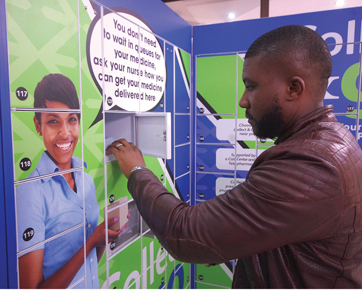 The Collect and Go smart lockers enable people to collect their repeat chronic medication from external pick-up points, without having to stand in queues and mingle with people who may be ill.
The Collect and Go smart lockers enable people to collect their repeat chronic medication from external pick-up points, without having to stand in queues and mingle with people who may be ill.
Patients whose chronic illnesses are in a stable condition and who want to use the lockers should register for the service at their healthcare facility. When it is time to collect their medication, a one-time PIN will be SMSed to them. The pin will be used to open the locker.
Patients are provided with a two-month supply of their medicine and are reminded to collect it every second month. A check-up at their local clinic must be done once a year, at which time they will be given a new prescription.
Collect and Go smart lockers are available in Gauteng, Mpumalanga and the Free State and are situated near public health facilities and busy areas like shopping centres.
Know your status
Now more than ever, people need to know their HIV status because this is one of the underlying diseases that could make you extremely ill should you contract COVID-19.
Workers from the Department of Health and non-profit organisation Right to Care who are doing mass community screenings for COVID-19 are also equipped to do free HIV tests.
“If you don’t know your HIV status, Right to Care and the Department of Health community counsellors will give you a respectful, free and confidential HIV test wherever you are comfortable: at your nearest facility, in your community or your home, making it easy for you to test, start treatment and stay on treatment,” says Dr Chuka Onaga from Right to Care.
The organisation’s Dr Seithati Molefi explains that people with HIV have a weaker immune system, which means their body will not be able to fight COVID-19 effectively. “It is critical that you get tested to know your status so that you can start antiretroviral (ARV) treatment should you be positive.
“Patients who have stopped taking their ARVs are also at risk of severe disease and should ensure that they get back on their medication immediately,” Dr Molefi says.
Farmers receive COVID-19 relief fund
Farmers receive COVID-19 relief fund Estelle GreeffMore than 15 000 small-scale farmers have been approved for the coronavirus (COVID-19) Agricultural Disaster Fund, says Agriculture, Land Reform and Rural Development Minister Thoko Didiza.
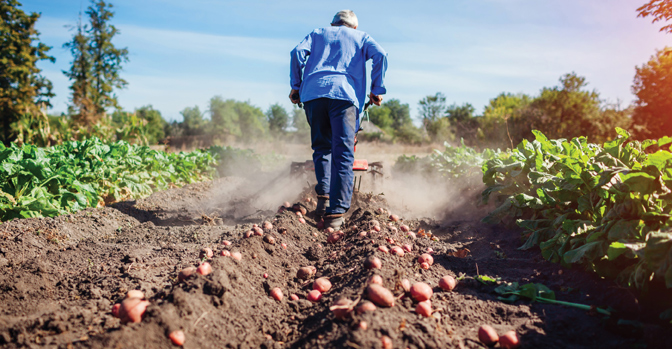 The Minister recently briefed the media on the outcome of the Agricultural Disaster Fund application process.
The Minister recently briefed the media on the outcome of the Agricultural Disaster Fund application process.
Minister Didiza said that 55 155 applications were received from smallholder and communal farmers, with the highest number of applications received from the Eastern Cape Province, followed by the Northern Cape and North West.
The R1.2 billion fund intervention aims to address the effects of coronavirus disease and ensure sustainable food production post the pandemic.
“To date, 15 036 applications have been approved, valued at just over R500 million in favour of smallholder and communal farmers. Of the 15 036 approved applications, 5 494 are women, 2 493 youth and 224 people living with disability and males at 9 542,” said the Minister.
Speaking at the virtual briefing, Minister Didiza said livestock has been the most requested commodity by farmers, followed by vegetables, poultry and fruits.
“Each of the approved farmers will receive inputs in line with the size of their farming operations up to a maximum of R50 000,” said the Minister.
The application process opened on 8 April and closed on 22 April 2020, with 33 000 manual application forms distributed through the department’s provincial and district offices, commodity and civil society organisations. She added that the department will finalise its decision on the remaining applications.
R400 million allocation
The Minister said a further R400 million is being channelled to farmers within the Proactive Land Acquisition Strategy (PLAS), who were already approved for the department’s Stimulus Package.
This had initially been budgeted for in the 2019/2020 financial year.
“It must be noted that an amount of R600 million had to be reprioritised from the Stimulus Package on PLAS farms in the 2019/2020 budget to assist the other smallholder and communal farmers in terms of this COVID-19 intervention.
“The issuance of vouchers to provinces will commence on 18 May 2020. The department engaged the services of different suppliers through an open Supply Chain Management process to avoid any delay in the delivery of these inputs,” she said.
Minister Didiza highlighted that there was a number of lessons learnt from the process, which will require government and the sectors, especially commodity groups working with small-scale and subsistence farmers, to build on.
Among others, the department has noted the lack of proper documentation or filing of documents by famers.
“It saddens me that during this process many of them fell by the sideway because they could not provide proof that they are farmers or farming. The registration of farmers on the Producer Farmer Register will enable government to locate farmers so that targeted support can be provided,” the Minister said.
She also urged farmer organisations to assist farmers in formalising their operations, especially insofar as record keeping is concerned.
The Minister emphasised that monitoring and evaluation of this programme is important to ensure value for money and food production. Therefore, the department will work with various non-governmental organisations and civil society organisations to monitor and evaluate the implementation of this intervention on the ground.
“Through this intervention, we want to ensure that agricultural production continues to ensure food security for the country. Food is being produced at farm level and deliveries are made to wholesalers, retailers, fresh produce markets and other critical distribution points.”
“We urge the food value chain role players to strictly comply and adhere to strict health regulations to contain and arrest the spread of COVID-19 as we strive to supply food to the nation,” Minister Didiza said. – SAnews.gov.za
Farmers warned to be vigilant
Farmers warned to be vigilant vuyelwanWhile Limpopo’s foot and mouth disease is easing, African swine flu has broken out in the Eastern Cape.
An outbreak of African swine fever (ASF) in Mnquma Local Municipality villages has been reported by the Department of Agriculture, Land Reform and Rural Development (DALRRD).
The disease was identified in Ngede, Nontshinga and Feni in Centane; Butterworth’s Tholeni village and Ngquthu in Ngqamakhwe.
ASF is a severe viral disease affecting domestic and wild pigs. Infected pigs have bleeding on the skin, lose their appetite, have diarrhoea and battle to breathe.
The disease is transmitted to pigs by contact with infected wild or domestic pigs and infected soft ticks, contact with people, vehicles, equipment or shoes, and eating contaminated food waste, feed or garbage.
The disease kills almost every pig that it infects and there is no known cure. The virus does not affect humans.
Curbing the spread of disease
DALRRD has put in place control measures to curb the spread of the disease. Minister Thoko Didiza says all infected pigs have been separated from those that have not been infected.
“The areas where the outbreak occurred have been quarantined; no pigs are allowed to move into, through or out of the area.”
In the past three years, there have been ASF outbreaks in the Free State, North West, Northern Cape, Gauteng and Mpumalanga.
In order to keep their animals safe from ASF, pig farmers are advised to:
- Enclose your pigs to prevent contact with pigs of unknown health status, including wild pigs and warthogs.
- Only buy healthy pigs from a reliable source.
- Preferably, do not feed kitchen waste, but if you have no option, remove all meat and cook the kitchen waste thoroughly.
- Do not to allow visitors to have contact with your pigs.
- Before having contact with pigs, wash hands, only use clean clothes, shoes, equipment and vehicles (that have not been in contact with other pigs).
“Pig farmers and keepers should therefore ensure that if any swill (kitchen waste) is to be fed to pigs, it should be pre-cooked for at least an hour. This will ensure the inactivation of the ASF virus, as well as other diseases of concern,” says Minister Didiza.
Health and safety measures
Commercial pig farmers in the affected areas are advised that when they move their pigs to the abattoir for slaughter, they must have health testimonials declaring that the herds of origin have not shown any signs of ASF and that the farm has not had more pig deaths than normal.
“Commercial piggeries are encouraged to comply with compartmentalisation biosecurity standards to protect their piggeries from infection. Pig farmers and keepers are requested to be vigilant and to report any sudden illness and deaths of their pigs to the local state veterinary office immediately,” Minister Didiza says.
Some heartening news is that the outbreak of foot and mouth disease (FMD) in 19 areas of Limpopo’s Molemole Local Municipality is easing and DALRRD has lifted the quarantine of three locations.
“Permission has been granted to eight feedlots to safely slaughter animals from affected premises at two abattoirs designated for this purpose. This process is continuing and more than 9 000 animals from farms under quarantine have been safely processed. Once all animals on affected properties have been slaughtered, quarantine can be lifted and the farming operations can resume,” says the minister.
To curb the spread of FMD, buyers of livestock are advised to not move animals showing signs of disease, not buy animals of unknown origin and not buy animals originating from known infected areas.
In addition, when buying animals one must:
- Insist on a veterinary health declaration before animals are brought onto the farm.
- Always place new arrivals in isolation until you can satisfy yourself of their health status.
The ASF and FMD outbreaks have both been reported to the World Organisation for Animal Health.
Government gets ready for services
Government gets ready for services Estelle GreeffGovernment services are slowly getting back to normal after the coronavirus (COVID-19) lockdown in March.
 Non-essential services provided by government started after South Africa moved to Level 4 of the lockdown.
Non-essential services provided by government started after South Africa moved to Level 4 of the lockdown.
Public Service and Administration Minister Senzo Mchunu advises that members should still phone to check if an office is indeed open, before physically going there. He urges people to only go to a government office if it is absolutely necessary and rather to see if they can be helped remotely.
Minister Mchunu says some departments will not be fully staffed because of social distancing measures. He advises that when people visit government offices, their details will be recorded for track and trace purposes.
“This excludes service recipients at service delivery points,” he says.
Government employees are set to return to work in phases, following a thorough cleaning of workplaces.
“Departments must develop a schedule for a staggered return of the workforce which will assist in managing the number of employees at the workplace at the same time, to maintain service and business continuity.”
The Minister says regulations outlined in a government circular detailing the plans and preparations needed to manage COVID-19 in the public service must be observed. These include temperature screening for each employee entering government buildings and the mandatory wearing of cloth masks at all times in the workplace by non-medical personnel.
Where possible, employees should continue working remotely from home. “Social distancing is an important consideration and as such, remote work has become an important mechanism in the fight against the spread of the disease.”
He says managers must and ensure that employees with underlying illnesses remain at home or work remotely until the pandemic has passed as they are more vulnerable to becoming critically ill should they contract the virus.
If, for whatever reason, such employees are required to physically go to work, it is incumbent on the relevant director generals and heads of department to take the necessary measures to ensure their employees’ wellbeing.
Government gives helping hand to ailing businesses
Government gives helping hand to ailing businesses JoyBusinesses that have been negatively affected by the coronavirus (COVID-19) stand to benefit from government’s R200 billion loan guarantee scheme.
 The scheme is an initiative to provide loans, guaranteed by government, to eligible businesses with an annual turnover of less than R300 million. Funds borrowed through this scheme can be used for operational expenses such as salaries, rent and lease agreements, contracts with suppliers and other things.
The scheme is an initiative to provide loans, guaranteed by government, to eligible businesses with an annual turnover of less than R300 million. Funds borrowed through this scheme can be used for operational expenses such as salaries, rent and lease agreements, contracts with suppliers and other things.
Announcing the scheme during an address to the nation in March, President Cyril Ramaphosa said it is expected that the scheme will support over 700 000 firms and more than three million employees.
“We will be introducing a R200 billion loan guarantee scheme in partnership with the major banks, the National Treasury and the South African Reserve Bank,” he said.
A joint statement by the National Treasury, the South African Reserve Bank (SARB) and the Banking Association South Africa (BASA) said Absa, First National Bank, Investec, Mercantile Bank, Nedbank and Standard Bank have started facilitating the applications.
Government and commercial banks are sharing the risks of these loans. Initially, the National Treasury has provided a guarantee of R100 billion to this scheme, with the option to increase the guarantee to R200 billion.
How the scheme will work
The SARB will lend money to commercial banks at the prevailing repo rate plus a 0.5 percent credit premium. Banks will lend this money to small and medium-sized businesses at the repo rate plus a fixed spread of 3.5 percent.
While these arrangements are designed to encourage banks to lend more than they otherwise would, banks are expected to make sound lending decisions and avoid reckless lending. The intention is not for banks to make a profit from these loans. Any net profits will be pooled to offset losses in the scheme, so as to minimise total losses to South African taxpayers.
For a business to benefit from the scheme, they must:
- Have an annual turnover of less than R300 million.
- Be in good standing with its bank loan payments or be an account holder without any loans as at the end of February 2020.
- Have an existing relationship with the bank granting the loan.
- Be registered with the South African Revenue Service.
- Be financially distressed as a result of the COVID-19 outbreak and subsequent lockdowns.
More details on the scheme can be found in a Frequently Asked Questions Guide posted on www.treasury.gov.za, www.resbank.co.za and www.banking.org.za.
Help for SA’s youth during COVID-19
Help for SA’s youth during COVID-19 JoyAs South Africa celebrates Youth Month,Vuk’uzenzele takes a look at help on hand for our youth.
 South Africa’s youth are our country’s future. As such, government and various other entities have put mechanisms in place to assist the youth during the coronavirus disease (COVID-19) pandemic.
South Africa’s youth are our country’s future. As such, government and various other entities have put mechanisms in place to assist the youth during the coronavirus disease (COVID-19) pandemic.
NYDA COVID-19 relief fund
The National Youth Development Agency (NYDA) recently launched the Youth Micro Enterprise Relief Fund (YMERF) to assist youth-owned enterprises – which might not qualify for other relief funds – during COVID-19.
Funding will be capped at R10 000 for every qualifying business. Applications are already open and they close on 30 May. For more information, visit www.nyda.gov.za.
SMME support intervention
The Department of Small Business Development introduced a small, medium and micro enterprise support intervention, which includes a debt relief fund and a business growth/resilience facility to mitigate the impact of COVID-19.
The facility provides working capital, stock, bridging finance, order finance and equipment finance to small businesses which supply in-demand medical supplies. Priority is being given to businesses owned by youth, women and people with disabilities. For more information and application criteria, visit www.dsbd.gov.za.
CSIR says YES to youth
As part of its commitment to the inclusive advancement of society through youth empowerment in South Africa, the Council for Scientific and Industrial Research (CSIR) has partnered with the Youth Employment Service (YES) to prepare young people for employment by providing them with technical skills and relevant work opportunities.
 The CSIR and YES recently signed a Sponsored Host Placement Agreement that will see them working together to equip youth with skills that will prepare them for the workplace. The two organisations believe that the collaboration will also accelerate South Africa’s transition into a knowledge-based economy. The partnership, which will run for one year, will see the creation of 66 job opportunities by the CSIR for the youth. Some of the youth will be based at the CSIR and some will be hosted through Youth@Work, a vetted YES implementation partner, and will be employed in various roles, including as mathematics and science teaching assistants; IT assistants in digital learning laboratories; computer coding facilitators; and digital learning facilitators at schools and municipal institutions, such as local libraries.For more information about YES,
The CSIR and YES recently signed a Sponsored Host Placement Agreement that will see them working together to equip youth with skills that will prepare them for the workplace. The two organisations believe that the collaboration will also accelerate South Africa’s transition into a knowledge-based economy. The partnership, which will run for one year, will see the creation of 66 job opportunities by the CSIR for the youth. Some of the youth will be based at the CSIR and some will be hosted through Youth@Work, a vetted YES implementation partner, and will be employed in various roles, including as mathematics and science teaching assistants; IT assistants in digital learning laboratories; computer coding facilitators; and digital learning facilitators at schools and municipal institutions, such as local libraries.For more information about YES,
visit www.yes4youth.co.za.
Apply easily for social distress grant
Government has put a COVID-19 Social Relief of Distress grant of R350 a month, until October, in place for unemployed youth and other individuals who do not receive any other form of social grant or Unemployment Insurance Fund payment.
Do not visit a South African Social Security Agency office to apply, as you will not be helped. There are various ways to apply. Visit https://srd.sassa.gov.za for more information.
Youth adapt and thrive course
The United Nations in South Africa partnered with Finland-based mobile learning service Funzi to launch a course aimed at delivering relevant and factual information during the COVID-19 pandemic.
The ‘COVID-19: Adapt and thrive’ course, in collaboration with Harambee Youth Employment Accelerator, is being rolled out nationally and aims to reach three million youth during lockdown.
The course addresses the physical, mental, social and financial impact that COVID-19 has on people’s lives. After learning how to adapt to and deal with the current situation, learners are directed to the Funzi Future Pack, which includes four courses that will equip them with skills to meaningfully develop themselves and help others to build a better future.
The courses are available on funzi.mobi, through any internet-connected mobile device.
How to deal with lockdown stress
How to deal with lockdown stress Estelle GreeffWith stress and anxiety levels increasing due to the coronavirus (COVID-19) lockdown, social workers from the Department of Social Development share some tips on how to cope.
I am starting to get cabin flu, what can I do?
This feeling can be expected, especially for those who would be active under normal circumstances.
Physical exercise can relieve boredom and keeps one healthy. You can also read or watch television programmes that are not related to COVID-19.
Researching and being knowledgeable about COVID-19 is also important. Try to understand the importance of the regulations and why adherence is key to flattening the curve.
I am a single mother and my children are starting to stress me out. How can I keep them entertained and myself sane?
It might be difficult to pay more attention to your kids, especially if their schoolwork was usually left to educators or tutors. However, this might be a fulfilling process for you as you will get direct feedback on how your kids might be improving.
Assign house chores to your kids to create a culture of responsibility; take your children outside the house, when it is safe to do so, to play in a yard.
Finding common ground could be the key.
I’m getting tired of all the house chores and it is creating a problem between my husband and I. How can I share the chores?
Improved communication is of great importance as there should be a mutual understanding between you and your husband.
Communicate the need for the family to work as a team - especially when both of you are at home.
I’ve noticed that my teenager is becoming more withdrawn. How do I get her to open up?
Your child's mental health is crucial at this point. It’s important to engage your child in the activities that she enjoys and encourage the culture of talking as a family.
You need to sit down with your teenager to find out what is bothering them and deal with their concerns positively.
Start a discussion about your perception of the lockdown and let your teenager know that you are there to listen. Assure them that you won’t judge her and won’t force them to discuss anything until their ready.
My partner has been abusive since the lockdown. What can I do?
Abuse comes in different forms, but no form of abuse should be tolerated as it can escalate.
It is critical to seek help immediately. This can be difficult in lockdown, as the perpetrator lives with you.
Remain calm in the presence of an abuser and refrain from alerting the perpetrator that you are seeking help. If you have access to a cellphone and are able to go alone to the shops to purchase essential goods, use the opportunity to contact the Gender-based Violence Command Centre (GBVCC).
Contact the GBVCC toll-free at 0800 428 428, SMS ‘Help’ to 31531, send a USSD (Please Call Me) to *120* 7867# or add ‘Helpme GBV’ to your Skype contacts. The Skype facility enables deaf clients communicate via sign language. You can also visit www.gbv.org.za.
Industry bands together to support performing artists
Industry bands together to support performing artists vuyelwanThe show must go on – even if audiences appreciate the performance remotely, from the comfort of their homes.
Amended lockdown regulations have made it possible for local performing artists to follow their passion once more.
The regulations now allow performing arts institutions, such as theatres, to use technology to stream live performances to viewers on the internet.
From May until December, the South African State Theatre in Pretoria is airing a variety of past productions on various online platforms and will also look at streaming live productions. 
Artistic Director Aubrey Sekhabi says this will provide welcome relief to artists.
“This is one of various plans and the social economic relief measures being rolled out by the theatre during these trying times. The pandemic provides opportunities as it calls upon all of us to review how we have done things for many years. We needed to think about doing business differently,” says Sekhabi.
“As we establish and grow our digital platform, we will reach audiences across Africa and the rest of the world. This presents our artists with significantly greater earning opportunities when our productions are watched by paying audiences.”
Meanwhile, the Market Theatre in Johannesburg is also using social media to promote artists and enable them to showcase their work.
“We decided as a theatre that we would love to make sure we carry on curating exciting content, celebrating the storytelling of this country, the playwrights and choreographers. We spoke to actors and put together monologues that are visible in the social media space,” says James Ngcobo, artistic director at the Market Theatre.
The Department of Cultural Affairs and Sport (DCAS) has supported performing artists through the R150 million COVID-19 Relief Fund. Meanwhile, other organisations, such as Business and Arts South Africa (BASA), have redesigned programmes in line with the challenges posed by the pandemic.
In partnership with the DCAS, BASA is running the Debut Programme, which is aimed at young performing artists from all nine provinces. The initiative helps emerging artists launch their first album, film, book or other artistic piece.
BASA also offers a supporting grants programme, which gives creatives once-off, short-term financial aid to cover COVID-19-related medical care or the loss of income caused by the cancellation of confirmed events.
*For more information about accessing BASA grants, email grants.basa@icloud.com.
JCPS Cluster outlines Level 3
JCPS Cluster outlines Level 3 vuyelwanThe Justice, Crime Prevention and Security (JCPS) Cluster has announced measures to enforce South Africa’s coronavirus (COVID-19) Level 3 regulations.
Police Minister Bheki Cele said the JCPS Cluster will ensure that the public adheres to the Level 3 regulations that were announced by Cooperative Governance and Traditional Affairs Minister Nkosazana Dlamini-Zuma.
“Under Level 3, the responsibility of preventing the spread of the disease will be in the hands of every member of society,” Minister Cele said.
Permits for movement
Minister Cele reiterated that the movement of persons between provinces, metropolitan areas, districts and hotspots is prohibited, except for persons doing so to carry out work responsibilities or performing any service permitted under Level 3. “These people need a permit issued by their employer,” he said. 
People who need to travel to move to a new place of residence, care for an immediate family member, attend funerals, transport mortal remains, obtain medical treatment or return to their place of residence from a quarantine or isolation facility must have a permit from the authority concerned.
“The South African Police Service and other law enforcement agencies will continue to monitor local and inter-provincial movements, by holding roadblocks on national highways and rotating in suburbs, cities and towns,” Minister Cele confirmed.
In hotspots around the country, where the COVID-19 infection rate is increasing rapidly, the JCPS Cluster will conduct patrols and roadblocks.
Alcohol and tobacco sales
In Level 3, alcohol can only be sold from Monday to Thursday, between 9am and 5pm. Alcohol sales on Fridays, Saturdays, Sundays and public holidays are prohibited. The same rules apply to e-commerce alcohol sales.
“In Level 3, licenced liquor traders can sell liquor for consumption off-site. The consumption of liquor at the place of sale is prohibited,” the Minister said.
The transportation and distribution of liquor to licensed premises was permitted from 29 May.
“No special or events liquor licences may be approved for the duration of the national state of disaster,” said Minister Cele.
The sale of tobacco, tobacco products, e-cigarettes and related products remain prohibited, except when they are destined for the export market.
Borders still closed
South Africa’s borders are still closed for travel, except for the evacuation of stranded and distressed South African citizens, the evacuation of foreign nationals by their respective foreign missions, the movement of medical treatment cases and the transportation of goods to and from neighbouring countries.
“Daily commuters from neighbouring countries who attend school will be allowed to enter our borders with a special permit, subject to all COVID-19 regulations on transport and health,” said Minister Cele.
“The inspectorate, which forms part of coordinated security operations, will ensure that any undocumented or illegal nationals who are detained will be subject to deportation,” he added.
In addition, no visa or permitting functions will be open to the public in South Africa or at missions abroad during Level 3.
“Asylum and refugee services will remain closed. All asylum seeker permits lawfully issued, which have expired or are to expire during the period of the national state of disaster, are deemed to have been extended to 31 July 2020,” the Minister said.
Non-urgent court cases postponed
Minister Cele said that the Department of Justice and Constitutional Development will issue directives for operations of the Courts during Level 3.
“The department will prioritise urgent cases relating to corruption, sexual offences, gender-based violence and femicide, serious violent crimes, robbery, murder, assault and violation of COVID-19 regulations for speedy resolution.
“Where appropriate, the courts will use audio-visual communication, such as teleconferencing and videoconferencing to conclude urgent cases. All cases which are not urgent will be postponed,” the Minister said.
Minister Cele said the JCPS Cluster has received several allegations relating to the corruption of COVID-19 relief efforts earmarked for poor communities.
“In response to these allegations, the cluster has developed a collaboration framework which will ensure prevention, detection, investigation, prosecution and recovery of stolen assets and funds.
“Law enforcement officials have established an interim structure that will address all allegations of corruption and will ensure that those who are charged, face prosecution,” Minister Cele confirmed.
Matric rewrite exams rescheduled
Matric rewrite exams rescheduled angenithaStudents hoping to rewrite their matric exams this month will now have to wait until November.
The Department of Basic Education (DBE) has postponed the rewriting of the May/June matric exams due the coronavirus disease (COVID-19).
Candidates were set to sit for the Amended Senior Certificate (old version of matric) and the National Senior Certificate Examination from 4 May to 26 June.
Over 350 000 part-time candidates were due to rewrite their matric exams, including those who did not pass their 2019 finals and those who want to improve their marks.
In a letter to heads of provincial education departments, the DBE’s Director-General Mathanzima Mweli said that as COVID-19 has disrupted schooling, the May/June 2020 examinations had to be rescheduled.
They have now been merged with the November 2020 exams. The department will inform candidates about the merged exams’ registration process, examination centres and timetables in due course.
Learning and revision material is available to learners on the DBE’s website. Candidates simply have to click on the Second Chance Matric Support Programme link on the website to access study material.
The website contains accounting, agricultural science, business studies, economics, English first additional language, geography, history, mathematics, mathematics literacy, physical sciences and life sciences lessons.
To prepare for the exams, candidates can also test themselves via an e-exam, which is also available on the website. There are also past examination papers, Grade 12 exemplars and information booklets available on the website, to help candidates prepare.
More students return to campus
More students return to campus angenithaWhile further groups of post-school students are back on campus, remote learning continues for those not yet given the green light to return.
A maximum of 33 percent of the student population returned to their campuses, delivery sites and residences under level 3 of the national coronavirus disease (COVID-19) lockdown. 
Their return was announced by Higher Education and Training Minister Blade Nzimande when he talked about the risk-adjusted strategy for the post-school education and training (PSET) sector.
He said their return is on condition that they can be safely accommodated and supported in line with the department’s health and safety protocols.
“The PSET sector is committed to resume academic activities in line with the national risk-adjusted strategy. This includes putting remote learning systems in place as well as planning the gradual return to various campuses during various phases of the risk-adjusted strategy,” the Minister said.
The Minister said the 33 percent include the following cohorts:
- All groups that already returned during alert level 4.
- Students in the final year of their programmes, who are on a path to graduating in 2020.
- Final-year students who require access to laboratories, technical equipment, data, connectivity and access to residence and private accommodation.
- Students in all years of study who require clinical training in their programmes (provided that the clinical training platforms have sufficient space and can accommodate them while adhering to the safety protocols).
- Post-graduate students who require laboratory equipment and other technical equipment to undertake their studies.
In addition to the above, the Minister said institutions may also consider the selected return to residences of other categories of students who may face extreme difficulties in their home learning environments, provided that the above categories are prioritised, and all safety and logistical requirements are met.
This only applies to institutions based in districts that moved to level 3, depending on the readiness and capacity of each institution.
He emphasised that it is critical to ensure campuses remain committed to effective health screening and cleaning protocols to keep everyone safe.
Students not yet allowed to return to campus will be supported through remote multimodal teaching, learning and assessment.
Our democracy will help us overcome Covid-19
Our democracy will help us overcome Covid-19 angenithaWe often take our healthy and robust democracy for granted. Yet it is probably our greatest asset in our momentous struggle to overcome the coronavirus pandemic.
We have among the most politically-engaged citizenry in the world. A poll in 2018 by the Pew Research Center shows South Africans are strongly inclined to take political action about issues they feel most strongly about, such as health care, education, freedom of speech and corruption.
The poll confirms much that we already know about ourselves. We enjoy nothing more than robust engagement with our government and among ourselves on the burning issues of the day. We have an active civil society ever ready to safeguard our fundamental freedoms and rights.
One of the triumphs of our democracy is that every South African believes the Constitution protects them and that the courts are a fair and impartial arbiter of their interests.
I got thinking on these matters during a recent visit to the Eastern Cape to assess the province’s coronavirus state of readiness.
I was asked by a journalist whether I was concerned at the pending litigation challenging certain provisions of the Disaster Management Act. This law is the basis for all the regulations promulgated under the national state of disaster we declared to combat coronavirus.
Since the start of this crisis, a number of people have exercised their right to approach the courts. The lockdown regulations were challenged in the very first week of the lockdown by a private citizen from Mpumalanga who wanted an exemption from the travel prohibition to attend a funeral.
In the seven (7) weeks that have followed, there have been legal challenges from a number of individuals, religious bodies, political parties, NGOs and from business organisations against one measure or more of the lockdown provisions they were unhappy with. Some have succeeded in their legal challenges and some have not. Some had approached the courts on the basis of the urgency of their cases had their urgency arguments dismissed and others have found other avenues for the relief they sought. Others have subsequently withdrawn their applications following engagement with government.
While we would prefer to avoid the need for any legal action against government, we should accept that citizens who are unhappy with whatever action that government has decided on implementing have a right to approach our courts for any form of relief they seek. This is a normal tenet of a constitutional democracy and a perfectly acceptable practice in a country founded on the rule of law.
We have checks and balances in place to ensure that every aspect of governance is able to withstand constitutional scrutiny. Where we are found wanting, we will be held to account by our courts and, above all, by our citizens. Besides our courts, our Chapter 9 institutions exist to advance the rights of citizens, as do the bodies tasked with oversight over the law enforcement agencies.
As I told the journalist, every South African has a right to approach the courts and even I, as President, could never stand in the way of anybody exercising that right.
There has been, and will continue to be, robust and strident critique of a number of aspects of our national response to coronavirus, from the data modelling and projections, to the economic effects of the lockdown, to the regulations. As government we have neither called for such critique to be tempered or for it to be silenced.
To the contrary, criticism, where it is constructive, helps us to adapt and to move with agility in response to changing circumstances and conditions. It enriches public debate and gives us all a broader understanding of the issues at play.
We have consistently maintained that we rely on scientific, economic and empirical data when it comes to making decisions and formulating regulations around our coronavirus response. To the greatest extent possible under these challenging circumstances, we aim for consultation and engagement. We want all South Africans to be part of this national effort. The voices of ordinary citizens must continue to be heard at a time as critical as this.
The coronavirus pandemic and the measures we have taken to combat it have taken a heavy toll on our people. It has caused huge disruption and hardship. Although we can point to the progress we have made in delaying the transmission of the virus, there is still a long way to go. The weeks and months ahead will be difficult and will demand much more from our people.
The pandemic will therefore continue to place an enormous strain on our society and our institutions. Even as we gradually open up the economy, the impact on people’s material conditions will be severe. For as long as this is the case, the potential for conflict, discord and dissatisfaction will remain.
As we navigate these turbulent waters, our Constitution is our most important guide and our most valued protection. Our robust democracy provides the strength and the resilience we need to overcome this deep crisis.
Just as government appreciates that most court applicants are motivated by the common good, so too should we recognise that the decisions taken by government are made in good faith and are meant to advance, and not to harm, the interests of South Africans.
Our foremost priority remains to save lives. Our every decision is informed by the need to advance the rights to life and dignity as set out in our Constitution.
We will continue to welcome different – even dissenting – viewpoints around our national coronavirus response. All viewpoints aid us and help us to work better and smarter.
The exercise of the fundamental freedoms of expression, association and speech is a barometer of the good health of our democracy. But much more than that, these rights are essential to the success of our national and collective struggle to overcome the coronavirus.
Overcrowding to be reduced
Overcrowding to be reduced vuyelwanThe Department of Correctional Services has the daunting task of curbing the spread of the coronavirus (COVID-19) in correctional centres, despite massive overcrowding.
Physical or social distancing is among the measures stipulated by government to combat the spread of the virus but Justice and Correctional Services Minister Ronald Lamola says the country’s correctional centres were 32.58 percent overcrowded at the start of May.
This has led to correctional facilities being considered high-risk areas for infection.
Minister Lamola says the department’s COVID-19 preventative measures are stretched to the brink despite its conscientious approach in implementing its COVID-19 disaster management response strategy of prevention, containment, treatment and recovery.
In order to address overcrowding in the centres, the department has received approval from President Cyril Ramaphosa to place selected categories of low-risk offenders into the community corrections system. 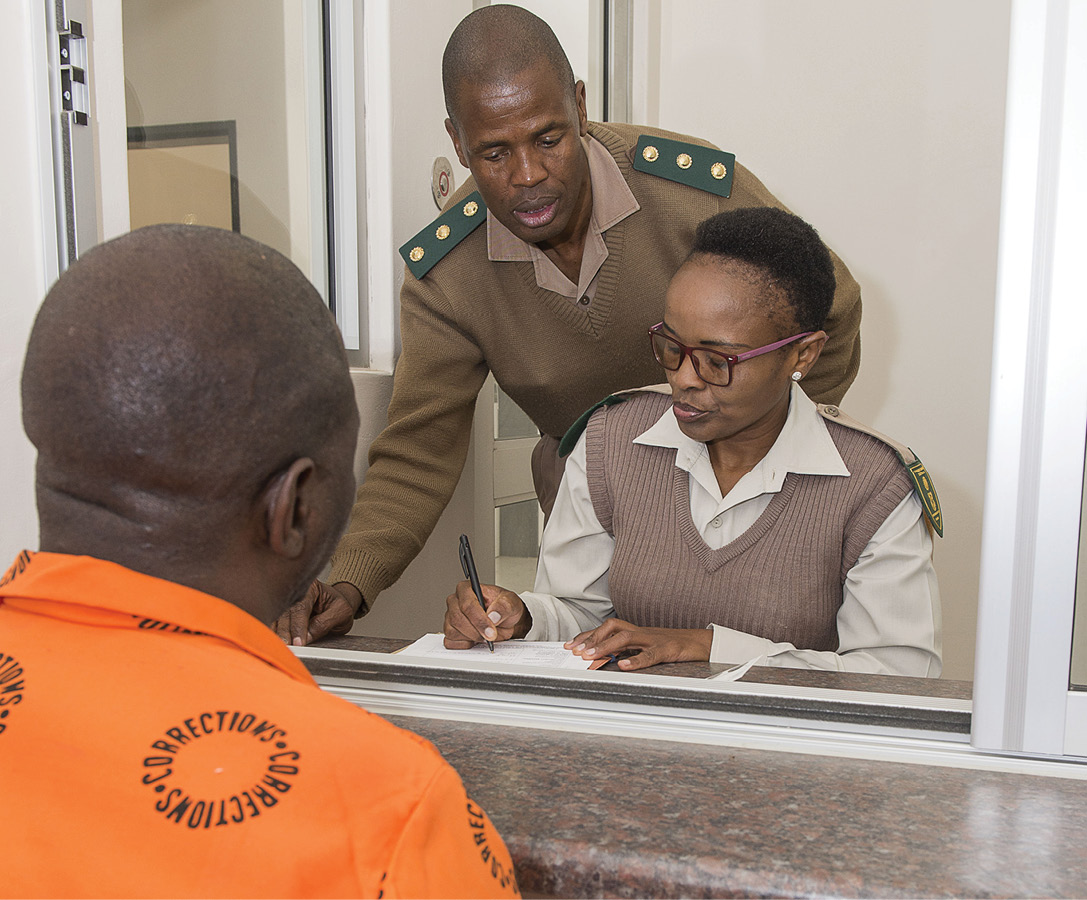
Only low-risk offenders who have or will reach their minimum detention periods within five years will be considered for release. Inmates sentenced to life imprisonment or serving terms for specified serious crimes, including sexual offences, murder and attempted murder, gender-based violence and child abuse, will not be released.
The President’s decision responds to a call by the United Nations for countries to reduce prison populations so that social distancing and self-isolation conditions can be observed during lockdowns.
Minister Lamola says the early release of prisoners is in accordance with Section 84(2) (j) of the Constitution, which gives the President the responsibility to pardon offenders.
In addition, Section 82 (1)(a) of the Correctional Services Act empowers the President to authorise the placement on correctional supervision or parole of any sentenced offender, subject to certain conditions being met.
Offenders may be arrested and ultimately reincarcerated if they violate their release conditions.
Minister Lamola says the release of prisoners will be done in phases, starting with the most vulnerable – such as those with underlying health problems, the elderly and female offenders with infants.
Approximately 19 000 inmates across the country will benefit, provided they meet the requirements of the parole boards.
Minister Lamola says the department will implement further preventative measures to safeguard inmates.
Remember: correctional centres rehabilitate
Remember: correctional centres rehabilitate vuyelwanCrime terrorises citizens in their homes, workplaces and even in public spaces, making the work of the criminal and justice system important.
Minister of Justice and Correctional Services Ronald Lamola says acts of criminality cause havoc and pain. He explains the department is determined that effective rehabilitation takes place behind the walls of correctional centres.
The Minister was reassuring South Africans following President Cyril Ramaphosa’s approval to place selected categories of low-risk offenders into the community corrections system.
The release of inmates was a measure of reducing overcrowding in correctional centre in light of the coronavirus disease pandemic.
Approximately 19 000 inmates across the country are expected to be released, provided they meet the requirements of the parole boards.
Minister Lamola says the department has a number of programmes in place that are aimed at correcting offending behaviour, aiding human development and promoting social responsibility and positive social values.
“We are inculcating a restorative justice system, which sees crime as an act against the victim and shifts the focus to repairing the harm that has been committed against the victim and community,” he says.
However, offenders also need assistance to transform their lives, he says. The department seeks to identify what needs to change to prevent further re-offending, the Minister says.
Inmates are provided with life skills, empowered to discard their previous lives of crime and be prepared for a second chance in life upon their release.
To teach inmates practical skills, they work in production workshops where they manufacture furniture, bread, shoes and their prison uniforms.
“We have 19 textile workshops, 10 steel workshops, 10 wood workshops, nine bakeries and one shoe factory.
“Our workshops specialise in wood machining, upholstery, welding, plate metalwork, fitting and turning, spray painting, powder coating, sign writing, confectionery, jig tool and dye making. Inmates gain valuable skills from the workshops which bolster their employment prospects and opportunities to establish their own businesses upon their release,” he adds.
In the past year, the department’s bakeries and farms produced 3.7 million loaves of bread and 6.3 litres of milk, in addition to vast quantities of fruit, meat and eggs.
“In response to the coronavirus, we will add the production of face masks in the workshops, which will significantly contribute towards the continued implementation of preventative measures in our facilities. We are also exploring producing soaps internally and work is at an advanced stage in this regard.”
SASSA rolls out Social Relief of Distress Grants
SASSA rolls out Social Relief of Distress Grants angenithaApplying for the special R350 coronavirus relief grant will be easy and paperless.
The Department of Social Development has relooked at and strengthened the criteria and payment methods for the COVID-19 Social Relief of Distress Grant.
Qualifying applicants of the new grant will receive R350 per month from May to October 2020.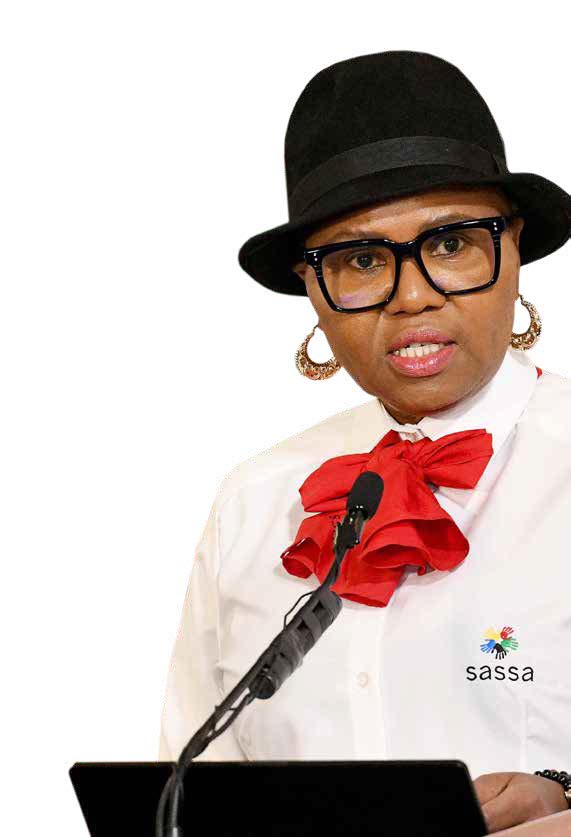
The applicant should be a South African citizen, permanent resident or refugee registered on the Home Affairs system and living within the borders of the Republic of South Africa.
Department of Social Development Minister Lindiwe Zulu says the full-scale implementation of the new grant is currently under way, following the successful pilot test of a contactless application system.
“We have set up a dedicated WhatsApp line, after having tested the concept through the Department of Health’s WhatsApp platform,” she says.
According to the department, 15 000 applications were loaded onto the system during the test phase and all qualifying applications were due to be paid by 15 May.
Minister Zulu says the department will remain vigilant and not tolerate any form of fraud and corruption.
“We have thus built in strong cyber security and monitoring mechanisms in this regard. All instances of suspected fraud or corruption will be investigated thoroughly,” she says. Appropriate action will be taken if misconduct is established.
How to apply
The special COVID-19 Social Relief of Distress Grant will be implemented in terms of the existing avenue provided for by the Social Relief for Distress channel, which is administered in accordance with the provisions of the Social Assistance Act, 2004.
In order to meet the qualifying criteria, applicants must:
- be above the age of 18
- be unemployed
- not be receiving any income
- not be receiving a social grant
- not be receiving any unemployment insurance benefit
- not qualify to receive unemployment insurance benefits
- not be receiving a stipend from the National Student Financial Aid Scheme; and
- not be resident in a government-funded or subsidised institution.
The department says applications may only be submitted electronically and prospective applicants should not visit the South African Social Security Agency (SASSA) offices to apply.
Applications can be submitted through one of the following channels:
- WhatsApp line: 082 0468 553
- USSD or SMS Line *134*7737#
- Email address: srd@sassa.gov.za
- Call centre: 0800 6010 11
- Website: srd.sassa.gov.za.
The department needs applicants to provide the following compulsory information:
- Identity number/Department of Home Affairs permit number
- Name and surname as captured on the ID (and initials)
- Gender and disability
- Banking details - bank name and account number
- Contact details - cellphone number
- Proof of residential address.
“We are mindful that we may have some challenges as we roll out this grant and we appeal to members of the public to exercise patience as we embark upon this journey,” the Minister says.
The department does not require any applicant to scan supporting documents, such as ID, proof of address or bank statements.
Applicants are cautioned not to provide their banking details to anyone to avoid scams. SASSA will only ask for information once the application has been approved. Beneficiaries and applicants should never give their PIN number or the CVV number on the back of their banking card to anyone – not even SASSA.”
“Once applications are approved, SASSA will request confirmation of bank accounts through a secure site – this will also be done electronically. Applicants have the right to request confirmation that a request is from SASSA in order to protect themselves.”
Payments will be deposited directly into an approved applicant’s bank account, if they have one. Applicants without bank accounts may also apply for the grant. Their money will be paid via a money transfer.
The department says the SMS line was developed to assist applicants who do not have smart phones.
Volunteers and community development workers will be deployed to assist those who have no access to technology.
SASSA reserves the right to validate the information provided by applicants with other public and private databases to prevent misrepresentation and potential fraud. Applicants will be required to agree to this before their application is processed.
Did you know?
Manual applications for the COVID-19 Social Relief of Distress Grant will not be done at SASSA offices at all and there will be no need to fill in paper application forms.
Small businesses must beware of scams
Small businesses must beware of scams angenithaThe Department of Small Business Development (DSBD) has warned small, medium and macro enterprises (SMMEs) against fraudulent agencies posing as representatives of the department.
“It has come to the attention of the department that an unknown company is requesting food producers and agro-processors to send through proposal to an e-mail address not known by the department, Small Enterprise Finance Agency SOC Ltd (SEFA) or Small Enterprise Development Agency (Seda),” the department said in a statement recently.
The DSBD says it is aware of suspicious email messages attempting to take advantage of the COVID-19 relief funding for SMMEs by soliciting administration fees to fast-track applications.
“Cyber criminals use emergencies such as the National Disaster to steal money from victims, perform identity theft or pretend to be representatives of the department and its agencies using fake emails to scam unsuspecting recipients.”
The public should note that the DSBD will not be launching any live market access session on Facebook.
“No employee of the department is paid either through emails, inboxes, direct messages (DM) for services rendered on behalf of the department. The facilitation to access services for SMMEs is done for free,” the department explained. -SAnews.gov.za
Any SMME who receives such a request must immediately report the incident to the COVID-19 Hotline 086 677 7867 or send an e-mail to info@dsbd.gov.za.
Information related to the department can be found on these official websites: www.dsbd.gov.za; www.sefa.org.za; www.seda.org.za; or www.mybindu.org.za. SMMEs are encouraged to register their businesses on www.smmesa.gov.za.
Social distancing-friendly SASSA payments ahead
Social distancing-friendly SASSA payments ahead angenithaSocial grant beneficiaries near Rustenburg in the North West were the first to use the cashless ATMs recently unveiled as additional payment points for South African Social Security Agency (SASSA) grants.
The cashless ATMs were launched by the South African Post Office (SAPO) to mark the commencement of the rolling-out of over 10 000 cashless ATM devices within spaza shops, townships and in rural areas.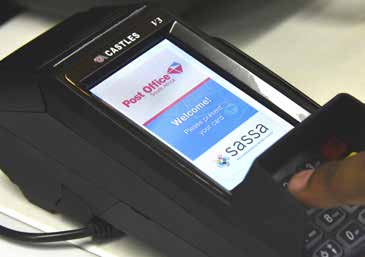
This initiative aims to bring financial services closer to where people live as well as address digital, economic and social divides in communities.
According to Deputy Minister of Communications and Digital Technologies Pinky Kekana, the SAPO cashless ATM solution responds to the department’s mandate to foster economic inclusion through technology innovations.
How do cashless ATMs work?
According to SAPO, SASSA beneficiaries making use of the new ATMs need to do the following:
- Insert your SASSA card into the ATM card slot and use your SASSA card pin to initiate a transaction (in the same manner you would draw cash at bank ATMs).
- Select the amount you want taken off your SASSA card.
- If the debit is successful, the cashless ATM will print out two slips (a merchant slip and a customer slip), confirming the debit.
- The customer will exchange the merchant slip for cash or goods to the same value, at their local spaza shop or another participating local retailer.
North West Social Development MEC Boitumelo Moiloa says the new system will stimulate local economic activity as SASSA beneficiaries will be spending their grant money at merchants within their localities, and the initiative will assist beneficiaries to stretch the rand value of each social grant disbursement as they will no longer have to travel long distances to reach grant payment points.
Chairperson of the Post Office Board Colleen Makhubele says bringing financial services to the people is one of the most important goals of the SAPO.
“We are proud to announce a product that takes South Africans one step further away from cash, and which will benefit local economies. Moreover, the strategy adopted by SAPO to place these cashless ATMs right where the people are, enables vulnerable members of society to make the absolute most of their grant,” she says.
SAPO says that in addition to accessing social grants, customers will be able to use the cashless ATMs to perform the following transactions safely, without the need to withdraw cash:
- Purchase pre-paid electricity
- Pre-paid airtime purchases
- Bill payments (for municipality and other bills)
- Insurance activations and payments
- Money transfers
- Ticketing
- Transport solutions (loading of contactless transport cards)
- Balance enquiries.
UIF reaches out to domestic and farm workers
UIF reaches out to domestic and farm workers JoyThe Department of Employment and Labour has begun efforts to reach domestic workers and farm labourers to enable them to benefit from the coronavirus disease (COVID-19) relief scheme.
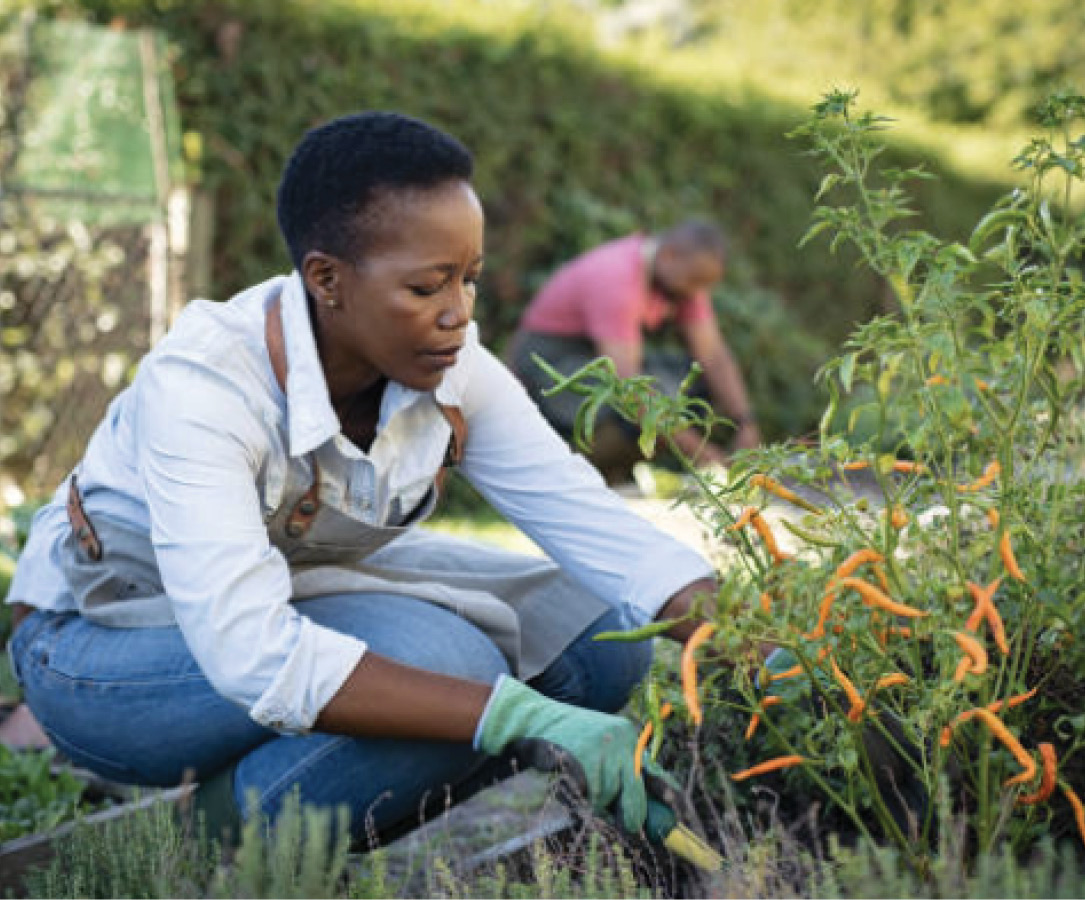 The scheme is part of a basket of government-wide services aimed at ensuring that the worst effects of the coronavirus pandemic are mitigated. The department’s relief fund has already paid out billions of rands to workers who may not have received a salary as a result of the lockdown.
The scheme is part of a basket of government-wide services aimed at ensuring that the worst effects of the coronavirus pandemic are mitigated. The department’s relief fund has already paid out billions of rands to workers who may not have received a salary as a result of the lockdown.
In a statement, Employment and Labour Minister Thulas Nxesi said: “Society is judged by how it tries to take care of the most vulnerable in its midst. This is why government in general, and the Department of Employment and Labour in particular, are doing everything in their power to shield the most vulnerable from the worst of the pandemic.
Since the lockdown was announced, the department, through the Unemployment Insurance Fund (UIF), has handed out almost R11 billion in benefits to workers through employers.
“We have appealed to employers, especially those who employ domestic workers and farm labourers, to apply on their behalf so that they are not left wanting.
“We sincerely hope that employers, especially in these two sectors, heed our call. We have also enlisted the help of a private company which is helping us trace these workers through their cell phones so that they are aware of the benefit and either get the employers to claim on their behalf or reach out to the UIF themselves,” said the Minister.
Private company, Interfile, has offered to run the SMS service to these sectors at no cost to the UIF. The department is working on the database it has, to try and reach these workers.
According to Department records, at least 91 406 domestic workers are on the database - however, only 2 968 have their cell numbers listed and only 25 518 have emails.
“We appeal to employers of domestic workers, those who may have difficulties paying them, to ensure that they access these services as soon as possible. The disbursements from UIF could also act as a top-up for reduced salaries and these are necessary for our mothers and sisters as they really need the break,” said Minister Nxesi. –
SAnews.gov.za
For more information log on to www.labour.gov.za or call the UIF on the toll-free number 0800 030 007.
What to expect when testing for COVID-19
What to expect when testing for COVID-19 Estelle GreeffTesting is critical in the fight against the coronavirus disease (COVID-19) because it gives government a picture of what it is up against and enables it to respond appropriately.
 The respiratory virus is spread through physical contact and respiratory droplets, which are spread when we cough, spit or sneeze. The virus can be fully diagnosed only through a lab test, which can be done at any of the capacitated 18 National Health Laboratory Service (NHLS) labs and at private labs.
The respiratory virus is spread through physical contact and respiratory droplets, which are spread when we cough, spit or sneeze. The virus can be fully diagnosed only through a lab test, which can be done at any of the capacitated 18 National Health Laboratory Service (NHLS) labs and at private labs.
The tests are done on samples collected from people exhibiting symptoms by swabbing the inside of their nose. Once a swab is done, the collected specimen is taken to a lab where a medical scientist, medical technician or medical technologist tests it for the presence of the virus.
Dr Florette Treurnicht, who is the head of Medical Virology at the NHLS, says a swab up the nose is done because respiratory illnesses like COVID-19 usually present in the upper airways of people. She says in the case of COVID-19, swabbing up the inside of the nose or inside the mouth produces a sample good enough to test for the virus. People may also cough up sputum for testing.
In a case where a patient is on respiratory support in ICU, the sample is taken by inserting a tube down the throat.
The process of conducting a test on a single sample can take anything between 45 minutes and two hours.
The tests are conducted at labs that have specialised virology testing kits. On average, each lab has between eight and 16 technicians and can complete 1 500 tests a day.
When NHLS labs have more tests than they can process, they ask for assistance from their private sector colleagues.
Dr Treurnicht says that while the labs have sufficient testing equipment, there is a shortage at some point-of-care centres.